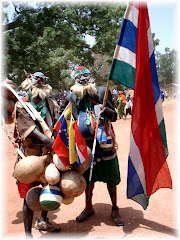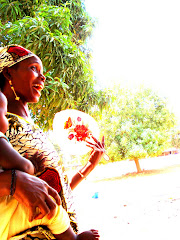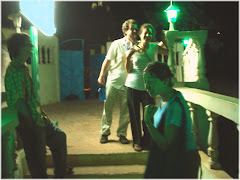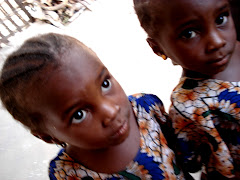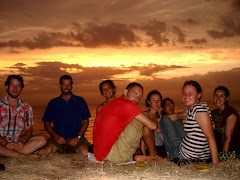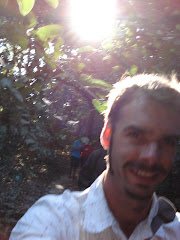
I won’t lie, I’m feeling a bit Dark Horsey these days. Since coming back from

Upon finishing my vacation, I returned to my village to find my entire backyard demonstration garden had become an animal feedlot. The green vibrancy I left behind for a month had become a ruined, dusty whirlwind. The cassava plants were gone, the sweet potatoes gone, the beans and tomatoes and eggplants were all gone. The papaya-tomato-pigeon pea guild was nothing but a single gnawed-off stump in the silty oblivion. My demonstration had become nothing but an abstraction. A year’s worth of work and planning is now nothing but the shit of sheep, goats, donkeys, and cows scattered around as if to inform me of each of the ruminants who had ruminated. Tattered plastic bags, leaking batteries, and discarded broken sandals completed the appearance of neglect.
I asked my host family what had happened. First the gate had been left open, later the cows came in the night and trampled the bamboo fence. Ko nye yaaki they told me. The cows disturbed this. After the cows came the donkeys, the sheep, and the goats.

When I left a month earlier, I asked my family to look after my garden and tree nursery until I got back. They told me Basi ala, no problem. They understand (I think) that I’m doing this for them. I want them to take an active role in this project. Sure, a small ebony tree in the dirt is little more than a stick with a few leaves. But in twenty years, the timber from that single tree could bring them a larger income than a whole field of groundnuts. The papayas and bananas are easy money-makers and require little more than water and protection.


Backyard gardens aside, at Nyambai I met with an even greater disappointment than I could have prepared myself for. Things at the National Beekeepers Association of The Gambia (NBAG) had deteriorated into, forgive the obvious metaphor, an upset hive of angry bees. The problem though was not with the temperamental Apis melifera but instead with the corruptible Homo sapiens. We had been witnessing an increasingly volatile conflict between the Board of Directors, the general staff, and the NGOs who provide financial support. Thus far, it has been a slow-burn but recently the drama flared-up with intensity. This finally culminated in the firing of the general manager (a good friend of mine), the withdrawal of Peace Corps support, and the call for an entire restructuring of the organization.
Again, my frustration initially was directed outwardly: What about all the work I’d done in that apiary, all the hive-management training I’d given, and all the plans I had for the coming year? What about the second module of the Feed the Minds rural trainings. What about the grant that Concern Universal just approved for me to conduct research in the apiary at NBAG in Nyambai? Many of us have worked long-hours with the staff to help make the honey operation a viable one. Now some have quit amongst accusations and back-stabbing, some have been sacked, and Peace Corps Volunteers are prohibited from going to the office and apiary.
It didn’t take long though for me to begin to feel like the problem was much larger than the obvious, more tangible inconveniences of this particular failure. The real problem seems to be something that I don’t have the capacity to improve upon. (Dissertations are written and critiques abound of development work in

Dishonesty, fraud, and bribe-taking are the axis of evil in the war on poverty and malnutrition. Police officers will gladly look the other way if they are handed a wadded bill by the unlicensed driver of an overloaded car of people. The manager of my regional Christian Children’s Fund recently absconded with thousands of dollars leaving thirty people unemployed for three months and five-hundred children with no school to go to. Teachers remove girls from the classrooms to wash clothes for them; headmasters sell bags of beans donated by the World Food Program. And at NBAG, money that had been donated by the European Commission for the construction of three new processing centers went into the pockets of the staff and the Board. One senior member of staff paid another one to not tell on him and then accepted a bribe from this same person to return the favor.
It is impossible to say just how deeply ingrained this type of dishonesty is in the Gambian system. The money is just too easy and the temptation overcomes even the most trustworthy. The cash from Tubob-adu flows swiftly into the pockets of the people who are “committed” to making those funds work for the greater good. I can imagine that some resist the enticement of the cash for a while but eventually they realize that their honesty does not pay. Continued poverty seems the reward for doing the right thing.
Can you blame them? Can I blame people who are struggling to put food on the table if they eventually take a little off the top? Can I blame my friends and the people I trust? Can I blame the public servant who hasn’t received a paycheck in months for taking a little fist-money? One of the people who had accepted a “tip” at NBAG is struggling with the fact that his wife has been suffering health problems. He can hardly afford the most basic of services and has been living in poverty for his entire life. Can I blame him taking a little money upon his realization that he was the only person there who hadn’t already?

What goes on under the table is often obscured from Peace Corps Volunteers who come here with a sense of hope and goodwill. We form strong bonds with our counterparts and believe that they share the same goals and ethics that brought us here. Discovering that corruption can happen to even the best of them can bring feelings of frustration, sadness, and hopelessness to the Volunteer. Personally, the past few weeks have left me feeling disillusioned, exhausted, and distracted. These emotions have had a drastic impact on my work, on my attitude, and on my outlook. When your counterparts disappoint you and your projects collapse, it is hard to not take-it personally.
But then the inevitable happens. After throwing all those gutter balls I pick-up a 7-10 split on the seventh frame and follow it with a strike. (These analogies are indicative of the fact that I miss bowling most of all the American establishments that I miss at all. Development might be more effective if we just exported ten pins and a twelve pound roller to all these people and let them work the rest out on their own. If I ever return to the
The small group of beekeepers that I hang out with near my village has impressed me so much these past few weeks. They have been gathering twice a week to weave grass hives for sale to the President of this country and have almost completed a third of his order. They plan to take the first one-hundred to His Excellency by the end of the month. They are excited to get a little cash income for all the cramped knuckles and tender fingertips that accompany weaving grass into cones and cylinders. With steady work, one man can usually make a hive in about three days.

They have really done a lot of work while I was away. I stood in front of the pile of hives that they had made and scratched the dust into my eyes. Each hive was unique; some were a little wonkity and misshapen but most were tight baskets big enough to house a healthy colony all summer. I felt a little strange standing in front of all those hives, a little conflicted. My ego, already strained, was hyper-active. I was a little ashamed, I hadn’t made hardly any of these (and the ones I had made were weydani- not nice). Here was another of my personal failures. Sure, they had made beehives, but what did I have to show for myself?

But then it struck me as I sat down with them and began to weave for the first time in over six weeks: This is exactly what I have been working towards. This is sustainable. This didn’t happen because I made it happen. These men had worked for their own development and they took pride (quietly) in their work. I had helped them organize, I had urged them to make grass hives, and I had helped cut some of the grass. Sometimes the successes in life are the intangibles like this. The bigger picture is hopeful and I am optimistic that even without me, this project will continue to help these people alleviate poverty. And it looks like they can do it without me, like they are going to do it regardless of what I expect of them. They welcomed me back, asked a few questions about Sierra Leone, and then encouraged me to try to make something weydi, something worthy of being sold alongside theirs.
And when I’m not at Badjie Kunda splitting my fingers on palm fronds, I’ve been cleaning-up my demonstration area. I’ve repaired the fence for now. I’ve watered the banana plant and brought it back to life, for now. I’ve re-hydrated the cacti and burned the alluvial flotsam, for now.
And we are trying to repair our relationship with NBAG, trying to see what can be done to recover everyone’s efforts. Some of us feel that we’ve put too much into that operation to let it perish. Too much work? Too much money? Sure, those also have been invested. But I think the true investment that we don’t want to squander is our hope and our enthusiasm for the National Beekeepers Association of The Gambia.
We will try to go ahead with the Feed the Minds trainings because that is the sort of grass-roots work that NBAG was founded on. Their motto-- Good Health, Local Wealth-- is still the way that many of us feel about beekeeping in The Gambia. Through NBAG, aid and development resources have made it into the hands (and minds) of rural people. Peace Corps Volunteers, Mondo Challenge Volunteers, Concern Universal extension workers, and employees of NBAG have worked toward that end. There is still plenty of optimism.
Also, the papaya tree in my back yard has sprouted new leaves.

And I would be leaving-out another bit of happiness if I didn’t tell you about Minh-Tam. This blog isn’t just about the harsh culture, dietary schisms, and weather discomforts that accompany living in The Gambia. I met this girl. Tammy was a Volunteer in
But I mention it because I have enjoyed her company since we met on a dance floor in October. For those of you who’ve seen me dance, she is the only girl I’ve met who can actually hang with me. And she sings karyoke with verve (The last time I was in a bowling alley, some of

I have experienced many different emotions over the past few months, to say nothing of the past year and a half that I’ve been in The Gambia. I’ve been here long enough now to have made very strong attachments to some of the people I've met. Two of those people are Nick and Amanda, and they are leaving soon. They have completed their work and are moving back to The States to see what sort of an impact they will have there.

Another of my friends, Kat has also left. She came here on the same plane as me and she was one of my closest site-mates. She’s moving to

I will miss Nick, Amanda, and Kat for the rest of the time I am here and I hope that, inshallah, they will be successful and happy. Yo allah ruta he jam.















